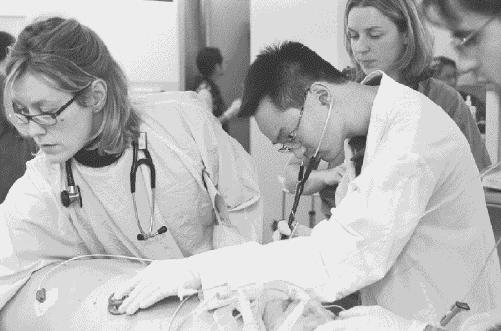Canada needs a US-style “national credentialing body” to assess the educational credentials of all foreign physicians and other health professionals seeking entrance to Canada, says the Medical Council of Canada.
Dr. Dale Dauphinee, who co-chaired the Canadian Taskforce on Licensure of IMGs (international medical graduates), doesn't have a timeline for creating this body. But the executive director of the council says it's a long-term goal.
“Today, anybody can produce a degree that looks [real],” Dauphinee says. “A piece of paper doesn't mean anything any more. You already have to go back to the school and make sure they graduated.”
This fall, the Council will submit a proposal to Health Canada outlining a national credentialing body. It would cost millions to create but would eventually operate on a cost-recovery basis, screening incoming health professionals for all Canadian jurisdictions.
Developing national guidelines to assess the credentials and competency of IMGs is the taskforce's core recommendation, which the Conference of Deputy Ministers of Health approved in December 2003. Ottawa has provided $4 million to help streamline licensure (CMAJ 2004; 178 [8]: 1216). Initiatives include promoting common screening criteria; developing national evaluation tools, a Web site and an online self-assessment test; and building a database for tracking and recruiting.
Finding doctors with the time and inclination to help assess and retrain IMGs remains the biggest obstacle to alleviating a backlog of an estimated 4000 foreigners seeking licensure, says Dr. Rod Crutcher, head of the steering committee implementing taskforce recommendations.
“Doctors are in generally short supply, and particularly doctors who have the availability, the willingness and the skills to work with the educational challenges of a very diverse group of trainees such as internationally trained doctors,” says Crutcher, who directs Alberta's program.
Although recent announcements herald “promising first steps,” the backlog of foreign graduates won't be eased until more provinces put substantially more money into assessment and retraining, says Joan Atlin, executive director of the Association of International Physicians and Surgeons.
“Ultimately, access to the assessments and training programs that people need are the bottom line,” Atlin says.
A June 23 announcement that Ontario will provide $26 million to double the number of training positions for foreign-trained graduates to 200 a year is a definite boost, says Bradley Sinclair, executive director of IMG Ontario, the province's assessment, training and placement centre.
“It's as if the government had created a second medical school or a new medical school just for IMGs,” Sinclair says. “If everyone were to respond the way Ontario has responded … on a per population basis, I think many of the problems would be alleviated just because there'd be much more opportunity.”
There are roughly 250 training positions set aside annually under provincial IMG programs outside of Quebec, says health consultant Robert Libbey of Ottawa-based Libbey Haughian Associates. That includes 6 in BC, 20 (12 family medicine, 8 specialist) in Alberta, 1 or 2 in Saskatchewan, 12 in Manitoba, 200 (100 family and 100 specialist) in Ontario, and 14 in Newfoundland and Labrador. There are no specific IMG programs in Prince Edward Island, New Brunswick, Nova Scotia or the Territories, and the exact numbers for Quebec aren't available, Libbey says. — Wayne Kondro, Ottawa

Figure. Canada needs to create a national path for IMGs to follow. Photo by: Adam Lund


